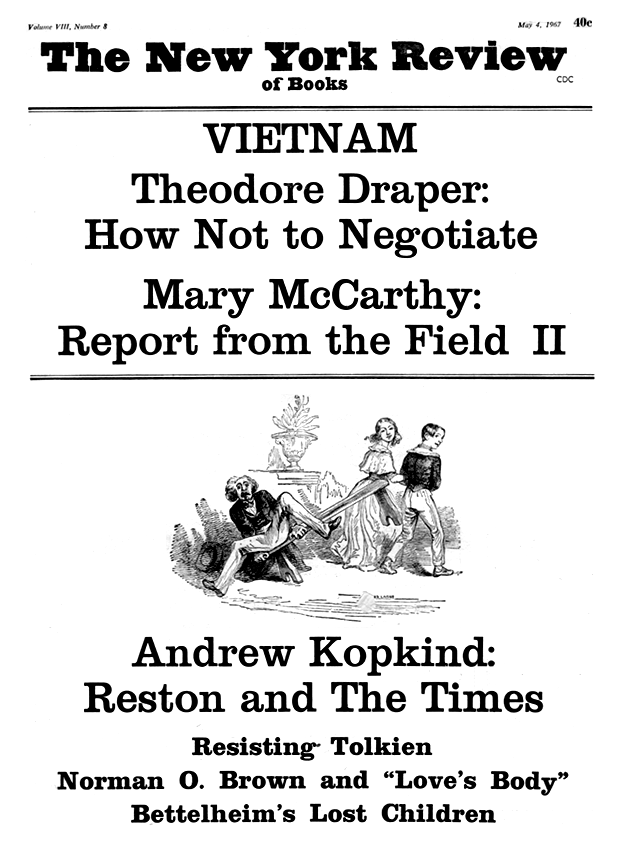In response to:
Hiss & Chambers from the April 6, 1967 issue
To the Editors:
Readers will form their own opinion of the merits of Professor Meyer Schapiro’s reply to my point that he turned the fact of Chambers’s denial upon oath that he engaged in espionage into the mild assertion that Chambers “avoided the imputation of espionage,” [NYR, April 6]. The reason I am obliged to return to this matter is that Professor Schapiro manages to introduce several new misconceptions about this case into his final sentence, which runs as follows: “It has yet to be shown how Chambers’s confessed perjury—which is perjury only if one believes that he had in fact been a Communist spy—invalidates the “important material evidence” that Professor O’Brien admits led to Hiss’s conviction.’
Chambers’s status as a perjurer is secure, irrespective of whether or not he had been a Communist spy. In the earlier stages of his testimony—before the libel suit—he swore that he had not engaged in espionage; in the later stages he swore that he had so engaged. Even Chambers’s warmest admirers must admit—though it is difficult to elicit the admission from them—that if the first testimony was not perjured then the second was, and if the second was not perjured then the first was, so that either way Chambers remains a perjurer.
No one claims that Chambers’s perjury invalidates the material evidence, and it was not the material evidence alone that led to Mr. Hiss’s conviction. Mr. Hiss was convicted by Chambers’s testimony plus the material evidence. The fact that the testimony was that of a known perjurer is a “detail” relevant to the formation of any opinion on the controversy which still continues around Mr. Hiss’s conviction. For one thing, material evidence which corroborates the testimony—some of the testimony—of a known perjurer is normally regarded with somewhat more caution and skepticism than is appropriate in ordinary circumstances. If the witness is known to be perjured, the hypothesis that his corroborating evidence may be forged—which is what Mr. Hiss claims—deserves careful consideration.
The climate in which Mr. Hiss was tried and convicted was of course one of maximum indulgence to anti-communist perjurers, and minimum skepticism about their testimony. The climate has changed in some degree, but attitudes formed during that period on particular matters still subsist. They include an unwillingness to acknowledge the fact that Whittaker Chambers was a perjurer. Professor Schapiro, in his reply, admits that this is “a matter of record.” No one, however, would have inferred this from the language used in his original review; language designed to gloss over the record in question.
Conor Cruise O’Brien
New York City
Meyer Schapiro replies:
I assumed that, in quoting Chamber’s admission of perjury from the text of the pre-trial hearings and in calling Chambers a “self-confessed perjurer,” Professor O’Brien regarded the confession of perjury as true and believed that Chambers was indeed a Communist spy. But if Chambers had not been a spy and perjured himself in saying that he had been, I can hardly be accused of “glossing over” a perjured statement. For the question of Hiss’s guilt it does make a great difference which statement of Chambers about espionage, the earlier or the later, one regards as false. Chambers’s original statement, if it was a lie, protected Hiss as well as Chambers. The second statement was confirmed by “the important material evidence” on which Hiss was convicted.
The hypothesis of forgery, conceived after the trials, takes up a good part of Dr. Zeligs’s book. Perhaps Professor O’Brien can improve its wildly implausible argument. Let him try.
Though I share Professor O’Brien’s view of the House Un-American Committee, I believe he is mistaken in his idea of the relative weight of climate and fact in the conviction of Hiss. In 1948 the audience at the hearings as well as the reporters at first mistrusted Chambers and favored Hiss. But Hiss’s evasiveness under questioning and his many statements which were demonstrably false (like those about the disposal of his car) created a strong suspicion that he was concealing a Communist past. As for the effect of the climate during the trials, I may quote a close observer, the Herald-Tribune reporter Bert Andrews, on Chambers’s perjury: “In the trials to come, it diminished the value of Chambers’s testimony and only a mountain of evidence by the State was able to offset the weakness in its case.”
This Issue
May 4, 1967


